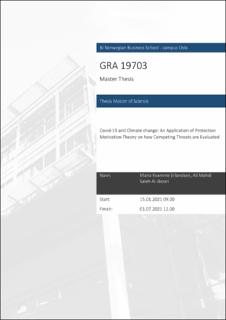Covid-19 and Climate change: An Application of Protection Motivation Theory on how Competing Threats are Evaluated
Master thesis
Permanent lenke
https://hdl.handle.net/11250/2827607Utgivelsesdato
2021Metadata
Vis full innførselSamlinger
- Master of Science [1621]
Sammendrag
Research within the field of threat evaluation has investigated several aspects of
how individuals evaluate and choose to cope with a threat, resulting in useful
findings for the field of research. However, there is limited research about how
individuals evaluate two competing threats. This thesis attempts to investigate the
literature gap by applying the framework of the Protection Motivation Theory
(PMT) to address how individuals deal with Covid-19 and Climate change as
competing threats. Furthermore, we will also investigate whether conflicting
information might impact the evaluation of the threats. Through a survey-based
experiment, (N = 93) participants were divided into three groups, where two
groups were exposed to a manipulation of conflicting information. Findings
shows that most individuals evaluated Covid-19 as the bigger threat. Results also
indicated that the use of PMT framework on how a single threat is evaluated, is
applicable for evaluating two competing threats. Furthermore, we found that most
individuals perceive that there is a conflict of the perceived effectiveness for the
preventive measures, depending on which threat the measure is supposed to
prevent. However, findings for self-efficacy revealed that individuals do not see a
conflict of whether a preventive measure is easy or difficult to perform depending
on which threat it is supposed to prevent, which goes against expected results.
Similarly, were we not able to conclude whether conflicting information might
impact the evaluation as our manipulation had no effect on individuals threat
valuation. Nevertheless, the findings might be useful as inspiration for future
research.
Beskrivelse
Masteroppgave(MSc) in Master of Science in Strategic Marketing Management - Handelshøyskolen BI, 2021
